 We have seen countless examples of digital campaigns interlocking with offline activities aimed at protesting against something or the other. And even though I agree that protest campaigns can be very important we have seen far less examples of digital activism for a particular thing. I would like talk about one initiative that makes use of the net and our role as consumers to facilitate actual positive change in the offline world.
We have seen countless examples of digital campaigns interlocking with offline activities aimed at protesting against something or the other. And even though I agree that protest campaigns can be very important we have seen far less examples of digital activism for a particular thing. I would like talk about one initiative that makes use of the net and our role as consumers to facilitate actual positive change in the offline world.
The Carrotmob initiative was started in San Francisco in 2008 and wants to make use of strategic consumption to change businesses behaviour. The video below shows how this approach works:
How Organized Consumer Purchasing Can Change Business from carrotmob on Vimeo.
The key aspect is that all participants, consumers and businesses, can achieve their goals without damaging the other. The buycott (as opposed to boycott), as it is sometimes called, does make use of core market principles and therefore is a “capitalist friendly” way of activism.
Even though the actual actions or buycotts are very local the initiative has spread to many countries all over the world. The internet is used both to communicate on the worldwide scale and to organise the local events. The organisers make use of their own websites and platforms like Facebook or Twitter to, in the end, organize offline activities.
Form this point of view the net is just a tool which helps to globalize and organize a creative form of activism. But I would argue that this kind of coordinated action and the quick spread to this many countries would not have been possible without the use of the net a tool for communication.
Thanks to Thore for introducing me to the idea.
]]>
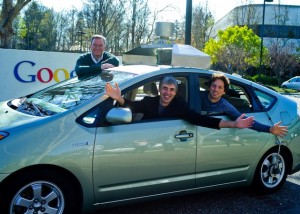 Yesterday Eric Schmidt stepped down as CEO of Google and he will act as the executive chair starting April 2010. The founder Larry Page will take over the day-to-day operations of the company (Sergey Brin will mainly focus on product development from now on). The impacts of these changes are discussed all over the web and I will not try to do that here.
Yesterday Eric Schmidt stepped down as CEO of Google and he will act as the executive chair starting April 2010. The founder Larry Page will take over the day-to-day operations of the company (Sergey Brin will mainly focus on product development from now on). The impacts of these changes are discussed all over the web and I will not try to do that here.
But there is another interesting angle on this whole issue. In his role as executive chair Mr Schmidt will be working on Government relations more heavily than before which might have a major impact on how the net is regulated and how Google interacts with government – which in turn could influence the field of eParticipation.
Taking this into account it makes sense to take a look at what Mr Schmidt said about his plans in terms of government relations. In the Q4 2010 Earnings Call he stated that he thinks that the problems Google had with governments in last few years (accidental collection of wifi data or the Streetview debate in Germany) might stem from the fact that “people don´t really understand what we really do and what we don´t do”. He follows up with the statement that the core strategy will be do communicate more intensely with regulators and government – “We are trying to be as transparent and collaborative as possible”. He also makes clear that Google thinks that regulators have an important job to do and that “they are there for a reason and we respect that”.
While Mr Schmidt makes clear that there is a need for more communication between government and the company he also says that he thinks that what Google does is “very pro competitive” – answering the complains that Google might behave anti-competitive in some areas like for example favouring their own products in search results.
In summary it looks like if Mr Schmidt will be more active in working with governments in the next years and I would argue that it is good for both the company and governments. Without a doubt he is a very knowledgeable and straight discussion partner for governments and from a citizen’s point of view his involvement might help to both improve internet regulations and speed up the process towards them.
Picture from Techcrunch.com
]]> Climate change is a reality and there is a significant increase of natural disasters as a result. Whether you look at Pakistan or Brandenburg news of floods or broken dikes is reaching us with alarming frequency. The metropolitan area of Hamburg in Germany has to prepare itself to be hit by these kinds of disasters like any other major city close to the sea. There is a need to develop sustainable measures to cope with the danger posed by climate change in the next decades.
Climate change is a reality and there is a significant increase of natural disasters as a result. Whether you look at Pakistan or Brandenburg news of floods or broken dikes is reaching us with alarming frequency. The metropolitan area of Hamburg in Germany has to prepare itself to be hit by these kinds of disasters like any other major city close to the sea. There is a need to develop sustainable measures to cope with the danger posed by climate change in the next decades.
On November 15th the online discourse “Floods in Hamburg – What reaction is necessary” was launched to discuss the dangers and potential measures against more frequent flood incidents. Citizens and experts are invited to visit hochwasser-nord.de and post their ideas and comments on how the city should be prepared for the future. Furthermore the website offers in-depth information on the possibilities to protect against floods and to adapt to them developed by companies and scientists.
The discussion will run for three weeks and has been initialized by the research project KLIMZUG-NORD, which has been mentioned on PEP-NET before. The project tries to develop a strategy to adapt large metropolitan area, like Hamburg, to the effects of climate change.
The results of the online discourse will provide important hints at what measures are acceptable to the public and will be integrated into the adaption strategy.
]]>The general idea is to encrypt the vote by separating the list of options from the actual vote and adding a unique identifier to each ballot. Even being critical of eVoting myself, I think the idea is pretty clever and well described in the 7 min TED talk:
]]>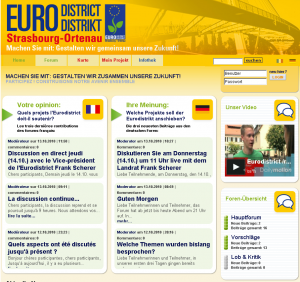 The tower of the Muenster in Strasbourg offers visitors a great view on the Eurodistrict, an area of intense cross-border collaboration between Germany and France. This region offers many advantages to its inhabitants but also brings with it its own challenges. Topics like the the bi-linguality, public transport and education are discussed on both sides of the border. Based on these possibilities and challenges the Eurodistrict was founded in 2005.
The tower of the Muenster in Strasbourg offers visitors a great view on the Eurodistrict, an area of intense cross-border collaboration between Germany and France. This region offers many advantages to its inhabitants but also brings with it its own challenges. Topics like the the bi-linguality, public transport and education are discussed on both sides of the border. Based on these possibilities and challenges the Eurodistrict was founded in 2005.
Since October 9th 2010 inhabitants of the region can discuss in an online-discourse how the future collaboration between the French and the German citizens should look like. Roland Ries, the president of the Eurodistrict organisation states that the online-discourse should “Improve everyday live and develop new forms of collaboration and political organisation”.
The online-discourse (mein.eurodistrikt.eu) was launched parallel to the kick-off event and will collect the views, ideas and statements by citizens in the region to achieve this goal. The discourse also includes live discussions with for example the German politician Frank Scherer (October 14th 11am) and others. These discussions, like the whole online-discourse, will be run both in German and French.
]]>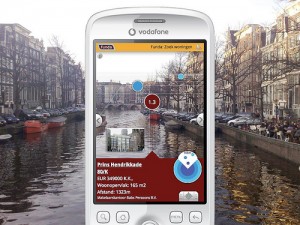 In January of 2010 I wrote an article about the possibilities of augmented reality in eParticipation. Three quarters of the year in augmented reality, as a method of layering information onto the real world, has developed further and looks like it is here to stay and therefore keeps being interesting for eParticipation. It however also is part of a greater challenge the eParticipation community faces.
In January of 2010 I wrote an article about the possibilities of augmented reality in eParticipation. Three quarters of the year in augmented reality, as a method of layering information onto the real world, has developed further and looks like it is here to stay and therefore keeps being interesting for eParticipation. It however also is part of a greater challenge the eParticipation community faces.
Several things hint at the coming of age of augmented reality:
- The platforms being able to use augmented reality apps have gotten more common with iOS and Android hardware having the necessary sensors and cameras and being widely successful in the market place. However with the availability of more devices the differences among them are also getting bigger (for example a gyroscope is only available in the iPhone 4 right now). This video gives a good overview of the available platforms).
- Augmented reality seems to come into the mainstream slowly as the discussion around PlaneFinder shows. This app lets you point your phone at a plane in the sky and get information like position, height and speed, and has been deemed as being possibly dangerous to airplane security. Even though augmented reality is still gimmicky in many cases new uses bubble up every day and the technology might find a strong place in mobile app use over time.
- Another hint of the growing interest in augmented reality is the time spent by developers building the apps. From September 2009 to June 2010 the number of AR apps in the Appstore rose from 83 to 480. This shows that augmented reality is still a niche but on the rise.
So what to make out of the fact that this way of displaying information on mobile devices is here to stay? For eParticipation this challenge has to be seen in the greater context of the transformation from almost all web-usage being in a standard web-browser on a computer to a multi-device (phone, tablet, TV) profile.
The eParticipation user of today might jump for one device and mode of usage (e.g. consuming information to adding content) to the other quickly and modern eParticipation platforms should be able to handle this challenge. From this angle augmented reality is just one more brick in the wall (consisting of many bricks).
I will pick up this topic in another article and try to discuss how the problem of getting eParticipation working in so many different settings could by addressed from a technical and procedural point of view.
]]>
The German website OffenerHaushalt.de (in German), built by Tactical Tools (“a network of enthusiast and experts”), tries to address this problem by presenting the federal budget of Germany in an interactive and intuitive fashion. The picture below shows the front page with each ministries budget presented in a different colour.
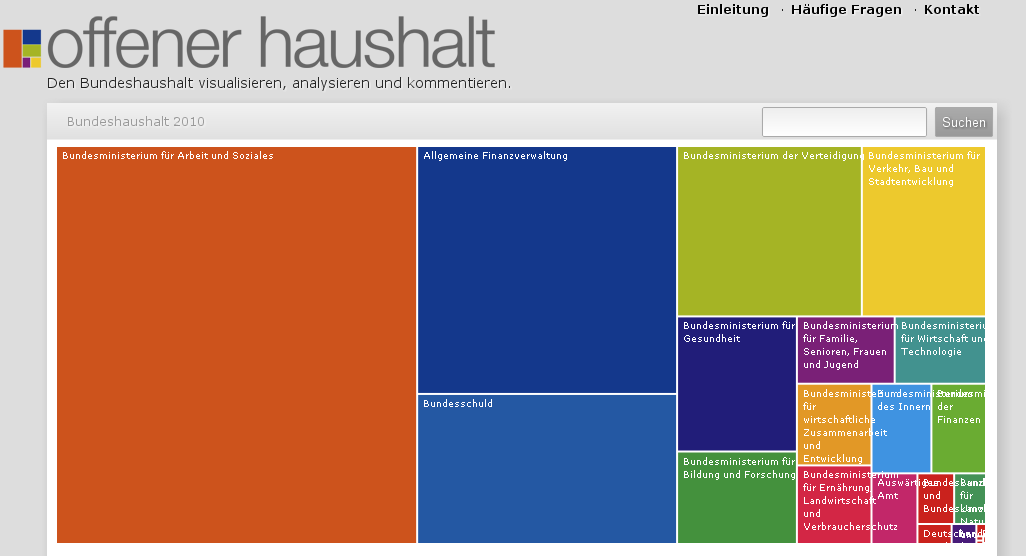
After clicking a budget (like in this case defense) the allocation of the budget to different areas and activities is shown in an easy to understand way. This way you can drill down into the budget to get a sense of its structure and how funds are used.
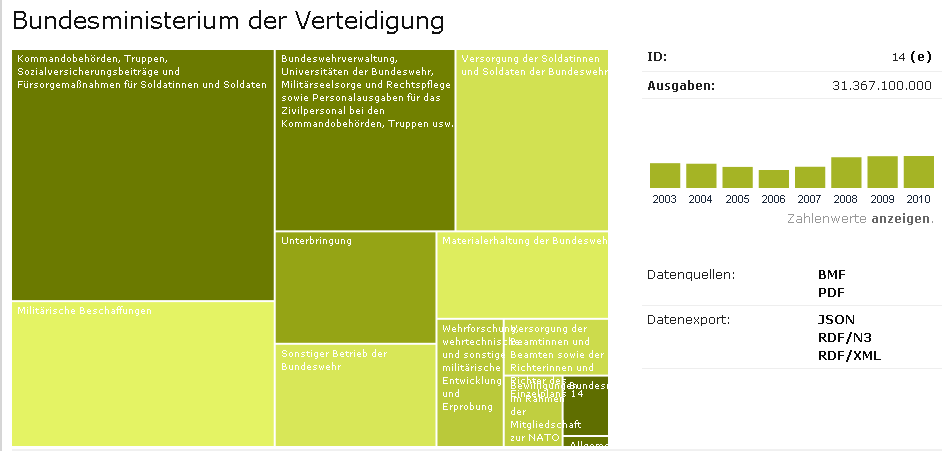
All data presented can also be exported in different standardized formats (JSON and XML among them) and all source data is also accessible. However there is also a sign for the need of more structured open data as the site is asking its visitors for hints to a machine readable version of the 2011 federal budget.
In summary this website is a great example of how to display complex numerical information in an accessible way. The ideas presented here could be integrated into eParticipatory budgeting processes to lower the barrier to entry for citizens or to help to introduce new audiences to these processes.
]]>
The video below shows the Government 2.0 Camp 2009 and keeping the development in Germany since then in mind this year’s crowd will possibly be even bigger:
A look at the sessions planning site shows the wide variety of topics that will be discussed: Open Source for Governments, law making processes using Government 2.0, Open Data, How to learn from Wikipedia and the list goes on.
After the great success of last year this year’s event puts a new twist on the open format of the unconference by splitting the event into two days and also two locations (both right in the city centre).
Day one (September 30st; 1pm till 7pm) will take place in the Bavarian Representation at the Federal Government in Berlin. This day will serve both as an introduction to the field for new attendees and interested persons and also provide room for a pre-planned program with high-level speakers.
The location for the second day (October 1st; 8:45am till 5:30pm) will be the Bertelsmann Foundations premises. This day will be held as an open unconference with attendees providing the contents of the sessions and lots of room for discussion and networking. You can add your idea for a session to this spreadsheet.
If you cannot join the event in person I would suggest following the #g20c hashtag on Twitter for comments and remarks from the participants and to give your input to the sessions.
As the Gov2.0 Camp attended by German speakers and most sessions are done in German the event is a great companion to the internationally focussed PEP-NET Summit a week earlier in Hamburg.
]]> Dr Thanassis Chrissafis, who will speak on behalf of the European Commission at the PEP-NET Summit, is possibly its most knowledgeable and experienced employee in the field of eParticipation. In his speech he will present the Commission’s efforts to advance the eParticipation field, including achievements, lessons learnt and next steps.
Dr Thanassis Chrissafis, who will speak on behalf of the European Commission at the PEP-NET Summit, is possibly its most knowledgeable and experienced employee in the field of eParticipation. In his speech he will present the Commission’s efforts to advance the eParticipation field, including achievements, lessons learnt and next steps.
The European Commission, especially the Unit for ICT for Government and Public Services (DG Information Society and Media), is among the key enablers of eParticipation in Europe and has helped to mature the field through its funding and research. eParticipation was at the centre of a number of its activities, for example the Competitiveness and Innovation Framework Programme, the eTEN Programme and the eParticipation Preparatory Action.
Dr Chrissafis studied economics (PhD) at the University of Sussex, UK and worked as a researcher in England until 1989. He joined the European Commission in the same year and has been, among other things, active in the fields of information society in regional programmes, eBusiness, coordinated socio-economic research in Information Society and worked on EU enlargement.
In his role as Programme Manager, Dr Chrissafis has influenced and helped advance the eParticipation field over several years. His work as a project officer in numerous innovative and successful projects has had a significant impact on the practical development of eParticipation and related research efforts. In particular, his involvement in the eParticipation Preparatory Action is of major significance. This activity aims to promote the development and use of ICT in legislative and decision-making processes in parliamentary and government environments. 21 different projects have been funded and run as part of this Preparatory Action. Following the Preparatory Action Dr Chrissafis continues his work on eParticipation for the European Commission, for example on the ICT-PSP Programme.
Dr Chrissafis is involved in PEP-NET as project officer and is PEP-NET’s primary contact in the European Commission.
]]>
Besides the content of the speech itself this is a great example of how to give a gripping presentation.
]]>